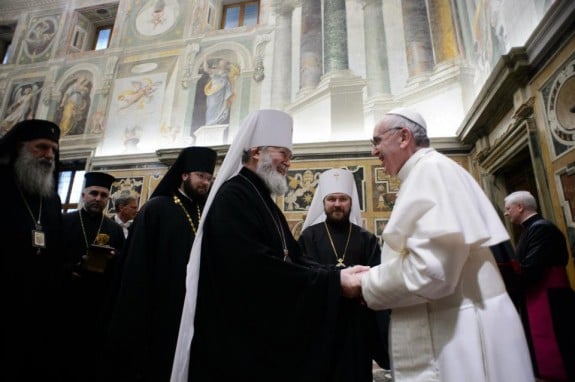Some details, from CNS:
For the good of all people, the care of the poor and the future of the Earth, religions must cooperate in reminding modern men and women that God exists and has a plan for their lives and their behavior, Pope Francis said.
“The Catholic Church knows the importance of promoting friendship and respect among men and women of different religious traditions,” he said, repeating the entire phrase twice for emphasis March 20 during a meeting with the Christian, Jewish, Muslim, Buddhist, Hindu, Sikh and Jain delegations that had come to the Vatican for his inauguration.
The Catholic Church, he said, “is equally aware of the responsibility that all have for this world, for creation — which we must love and protect — and we can do much good for those who are poor, weak and suffering, to favor justice, to promote reconciliation, to build peace.”
“But more than anything,” he said, “we must keep alive in the world the thirst for the Absolute. We must never allow a one-dimensional vision of the human person to prevail — a vision that reduces the person to what he produces and consumes.”…
…The pope told the religious leaders that he and they have an obligation to be close to people who do not belong to a faith community, but who are “searching for the truth, goodness and beauty.” Such people, he said, “are our precious allies in the commitment to defending human dignity in building peaceful coexistence among peoples and in safeguarding creation.”
And he had warm words on ecumenism, as well:
Pope Francis has a “strong desire” to continue the ecumenical journey towards the “noble cause” of Christian unity, he is confident that the “fraternal dialogue” with the Jewish people will continue, he “appreciates” the presence of Muslims at the ceremony marking the beginning of his pontificate, with which to promote “friendship and respect between men and women of different religious traditions”, a phrase repeated twice. And all believers “can do much” not only to promote peace and justice, but also to “keep thirst for the absolute alive in the world, not allowing a one-dimension vision of the human person prevail, where man is reduced to what he produces and consumes: this is one of the most dangerous pitfalls for our time. ” This morning’s meeting with 33 delegations from churches and religious denominations, Christian and non-Christian, who attended the inaugural mass of the new Pope was an insight into this pontificate’s line regarding relations with other Christians and religions, and even those who “do not even belong to any religions but who feel close to the truth and beauty”.
The Pope responded to the warm greetings of Patriarch Bartholomew and calling him Andrew, the name of the apostle founder and patron of the Patriarchate. “Yesterday morning – he adds – during Holy Mass, through your presence, I recognized the spiritual presence of the community you represent. In this manifestation of faith, the prayer for unity among believers in Christ seemed even more urgent to men and together somehow to see prefigured this full realization, which depends on the Divine plan and our sincere cooperation. ”
Francis then made a double reference to the link between the beginning of his pontificate, the Year of Faith and the fiftieth anniversary of Vatican II. He announced that want to continue the initiative of the Year of Faith, “a truly inspired” idea of Benedict XVI and then he quoted John XXIII. “Together with you – he said – I can not forget how the council’s significance for the ecumenical journey. I like to remember the words that Blessed John XXIII, of whom we will soon mark 50 years since his death, when he gave his memorable inauguration speech: “The Catholic Church therefore considers it her duty to work actively so that there may be fulfilled the great mystery of that unity, which Christ Jesus invoked with fervent prayer from His heavenly Father on the eve of His sacrifice. She rejoices in peace, knowing well that she is intimately associated with that prayer'”.
“Yes, dear brothers and sisters in Christ, let us all be intimately united to our Saviour’s prayer at the Last Supper, to his invocation: ut unum sint. We call merciful Father to be able to fully live the faith that we have received as a gift on the day of our Baptism, and to be able to it free, joyful and courageous testimony. The more we are faithful to his will, in thoughts, in words and in deeds, the more we will truly and substantially walk towards unity”.












